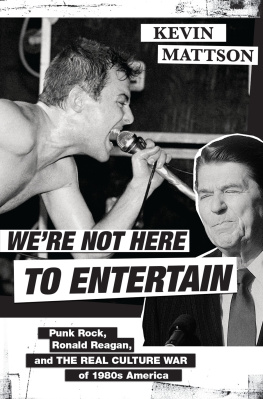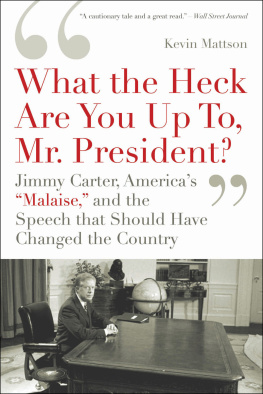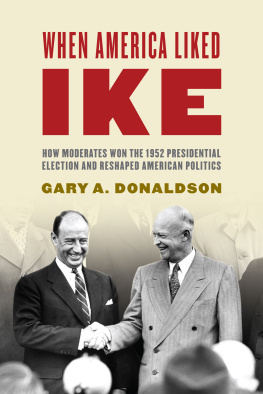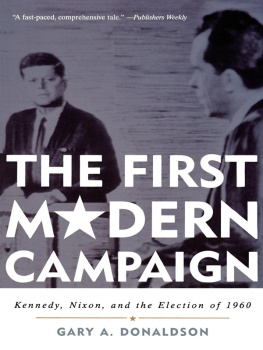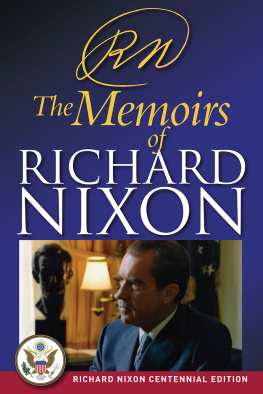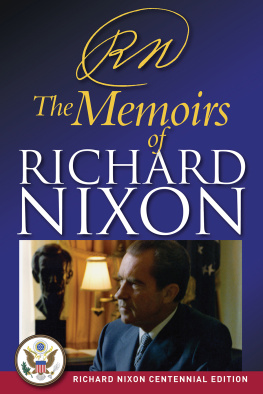Creating a Democratic Public: The Struggle for Urban Participatory Democracy During the Progressive Era
Intellectuals in Action: The Origins of the New Left and Radical Liberalism, 19451970
When America Was Great: The Fighting Faith of Postwar Liberalism
Upton Sinclair and the Other American Century
Rebels All! A Short History of the Conservative Mind in Postwar America
What the Heck Are You Up To, Mr. President? Jimmy Carter, Americas Malaise, and the Speech That Should Have Changed the Country
The Cause: The Fight for American Liberalism from Franklin Roosevelt to Barack Obama (co-authored with Eric Alterman)
AS EDITOR
Democracys Moment: Reforming the American Political System for the 21st Century
Steal This University: The Rise of the Corporate University and the Academic Labor Movement
Liberalism for a New Century
JUST PLAIN DICK
Richard Nixons Checkers Speech and
the Rocking, Socking Election of 1952
KEVIN MATTSON

For Vicky, once more and with more
The Fifties were not the Eisenhower years but the Nixon years. That was the decade when the American lower middle class in the person of this man moved to engrave into the history of the United States, as the voice of America, its own faltering spirit, its self-pity and its envy its whole peevish, resentful whine. The Nixon years belonged to the graduates of those courses in how to influence people since it was no longer of value to win friends clerks who call themselves junior executives, young men ashamed of their origins and of themselves.
MURRAY KEMPTON, TIME AND NIXON,
NOVEMBER 13, 1962
The presidential candidate ought to think of himself as similar to the manager of a crew of house-to-house salesmen. His function is to give them confidence in their product.
JAMES L. WICK, HOW NOT TO RUN
FOR PRESIDENT, 1952
Every Presidential election really is a self-portrait of America.
SAMUEL LUBELL, THE FUTURE OF AMERICAN POLITICS, 1952
Contents
Introduction
Portrait of the Young Political Artist as Madman (from the Inner Cranium to History)
I.
If the brain waves of Richard Nixon had been read between September 18 and 22, 1952, they might have gone like this:
Goddamn bastards want me out. They want to sack my political career. They dont have much on me, but theyll use what they have. Thats how they play, those sluggers and smear boys in the liberal press. Here I am slumping in a chair on my train, just rattling along, heading out of Californiamy fair statetowards the soggy center of Oregon. And all Im hearing from that fat little man who bubbles with fine political advice and fumes about my enemies is that the press boys are going wild with this thing. I could feel my eyes glancing back at that headline in the left-wing smear-sheet, the New York Post: SECRET RICH MENS TRUST FUND KEEPS NIXON IN STYLE FAR BEYOND HIS SALARY. That was one bastard of a headline.
What have they got on me? Not much. A crummy $18,235a fundgiven to me by businessmen in real estate, ranching, oil, and banking. Well, not directly to me. They gave it to Dana Smith, a fine tax lawyer and a friend
And Im hearing about it now. Every time I head for the back of the train to give a stump speech I know Im going to get an ear and an eyeful of the crap theyve been smearing me with. I go out there and first hear the good people cheering but then scan the crowds and whats that? Some wisecracking college kid waving a sign:NO MINK COATS FOR NIXONJUST COLD CASH. Damn straight, Im thinking, no mink coats like the one given to some secretary in Harry Trumans White House as a lousy bribe. I feel the words come right out of my mouth: Thats absolutely right. There are no mink coats for the Nixons. I am proud to say my wife, Pat, wears a good Republican cloth coat. Oh, the crowds on my side loved that one. They start yelling to tear down the sign and calling the young man waving it a Dirty Communist. Looks like a fight is breaking out.
Then later that day this sort of thing gets worse. I get out of my train with Pat, and there are more bastards waving signs about Poor Nixon and throwing pennies and nickels at my head. Theyve dressed up like blind beggars, which really wasnt that funny except to them. Some even came up and shoved me. Im in a small-scale war.
I remember just a few days ago, winding down a speech, I watched these guys break from a car, looking like hoodlums, and run towards my rally screaming out, Tell us about the sixteen thousand dollars! They didnt even have their numbers right, it was more like eighteen thousand. But I didnt care about that. Damn train had started to pull out, and I turned around, gripping the rail to keep steady, and screamed, Hold the train! Hold the train! It
What a man needs at a time like this is a strong boss who bolsters you, tells you things will be fine. Like a good football coach who is stern but gives you a pep talk at halftime to get through the rest of the game. But what do I have? General Dwight D. Eisenhower, once Supreme Commander of the Allied Forces during the Second World War. I still remember the first time I saw him in a celebration parade when the war wound down. He was waving his hands and looking into the crowds with his piercing blue eyes and giving them that warm grin he had. And I remember just getting a shiver up my back. He looked strong but also kind. But now he had grown aloof on me. Here I am wondering if Im going to remain the vice-presidential candidate, and heres Ike halfway across the country sending out all these mixed messages to the media. He was sounding like some bank manager with stiff arms who couldnt make up his mind about a loan. When he heard about the fund crisis, he said, I intend to talk with Dick at the earliest time we can reach each other by telephone. But then he didnt call me for days, just kept me hanging, saying he wanted to see where things headed, kept pushing all of this onto my table, making it seem that he was too damn busy to take the time to talk it out with me.
I bet hes talking to other people. Thats what I thought. Theres that damn circle of men, some of them his golfing buddies and fishing partners, sitting on the train, I can just imagine, unloading all this crap about me. There was campaign manager Sherman Adams, blue-blood Eastern Establishment type from New Hampshire, cold and chiseled face full of defenses. Sherm just clammed up, like he was hiding something from you, even though he knew full well there was talk about getting a replacement for me on the ticket at the time. Then there was the worst: Bill Robinson, publisher of the New York Herald Tribune and an old golfing buddy of the generals, who was getting his boys at the newspaper to call for my goddamn resignation, right there in the op-ed section. And I bet Ikes brother, Milt, who went everywhere with the general, it seemed, was nodding his head at Robinson. Then there was Mr. Chapman of New York, code name for Tom Dewey, the failed presidential candidate and governor of New York and the man who originally recruited me onto Ikes team back in spring. He liked me once, smiling at me with that little mustache of his that would stretch his face out and show the space between his teeth. But now Dewey was getting cold feet about the situation. Man could turn hard fast; sometimes he seemed like a real phony. Hed call me up at odd hours and tell me I should quit and get off the ticket. Kill my political career


